Michael Walters
Notes from the peninsula
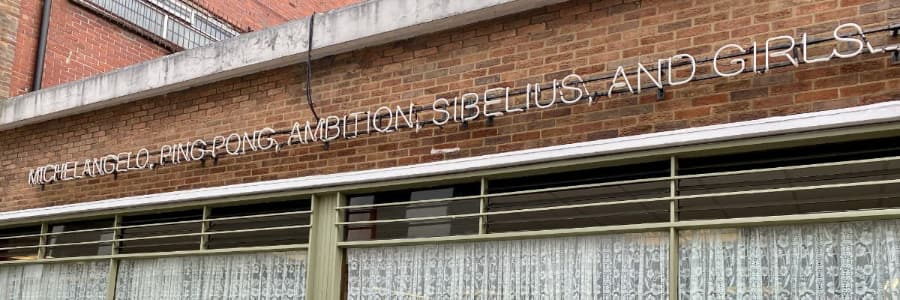
Kardomah
When I visit my father, I always love to walk around Swansea and get an early morning coffee. We used to come as a family on Saturday mornings when I was growing up, so with my existing coffee and writing habit it’s a double comfort. It also gets me out of the house, which is frozen in amber and not somewhere I want to hang around while my dad gets up. This time I walked past the Kardomah, a Swansea landmark famous for its links with Dylan Thomas and his ’Kardomah Gang’, a group of intellectuals who met there in the 1930s. I wish the neon in the photograph was lit. It’s a lovely list.
The summer seems to be accelerating beneath my feet. Being in Port Talbot always puts me in a reflective mood. I brought with me James Hollis’s amazing book, Finding Meaning in the Second Half of Life, as well as the rather more prosaic Essentialism, by Greg McKeown. I’ve read both before, but they jumped into my hands from the bookshelf as I was packing. Hollis’s masterwork is a Jungian take on how to engage with yourself to live a meaningful life. That ‘yourself’ is the key to the book—the psyche, the soul, the unconscious, however you label it, it’s the part of us that knows what we need to heal,flourish and grow, but as adults we’re often conditioned to ignore.
Right now, I’m questioning my excitement over my new job in September, and my guilt at not wanting to write. It should be the other way around. I’ve always put writing first and felt guilty at not being as into my day job. There is some sort of correction going on, which is interesting and a bit scary. Anyway, the book is a reminder of what’s at play under the surface, and perhaps I can use what I learn in my writing.
Essentialism is much lighter fayre, a reminder to say no to most things and yes to very few. Where Hollis advocates conversations with the psyche, in whatever way we can, to find the things we truly want to do, McKeown is saying to go all in on one thing instead of diffusing energy into many things. That’s the same advice, but without the depth. I can see now why I brought them.
I’m sick of beating myself up over not writing. It’s exhausting and ridiculous. What is meaningful and essential to me this summer is to be healthier, be fully present with my family, do a good job of moving jobs, enjoy our first family holiday abroad, and keep my literary life ticking over. These are my current priorities. Perhaps I need to switch some of them around, and perhaps I don’t, but this is where I am.
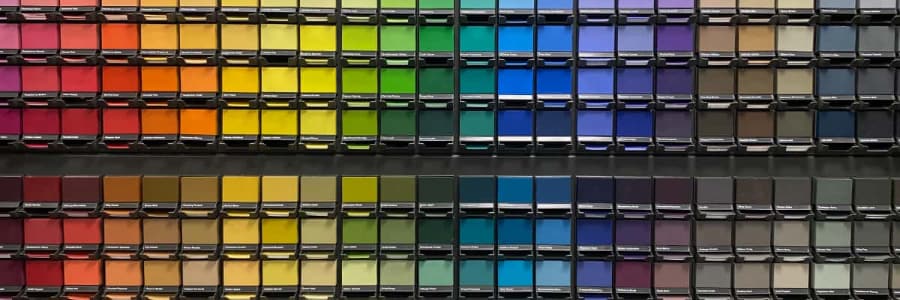
Trust your enthusiasms
It’s been a highly unusual period for me since pausing the podcast. After fourteen years in my day job, I am finally leaving. My new role is still coding, but instead of being in Higher Education I’m going to be a consultant with a subsidiary of a global corporation. The PRIVATE SECTOR. It’s taken a lot of effort to make the change–I hadn’t had a job interview in a long time. I’m amazed at what I’ve done. It’s exciting.
I’m also writing in the mornings. The novel continues to come into focus, and I wonder if that’s because I’m taking charge of my career too. I’ve been guilty in the past of compartmentalising the energies in my life, but it’s all one energy source, and I wonder how much I’ve been holding my writing back by letting myself stay in one job too long. I’ve always been afraid that a new job would distract from writing, but if you’re not writing anyway…
I haven’t had time to think about the podcast and what I might do with it next. Someone tweeted the other day that podcasts are easy because you just talk, you don’t have to write, and maybe it was an avoidance move, but I definitely learned a lot.
I’m going to continue to trust my enthusiasms. I hope your creativity is in full flow too.

ChillerCon UK 2022
ChillerCon UK 2022 emerged from the ashes of the Covid-struck StokerCon 2020, miraculously held together by the heroic organisers who had to deal with cancelled hotel rooms, refunds, and much else I’ll never know about. The original idea when I bought the ticket in 2019 was to find my tribe and network with other writers off the back of The Complex being published. I wasn’t sure I wanted to still go. Almost three years on, since Salt are not a genre-specific publisher, and The Complex didn’t get much attention in the media, I knew nobody would know anything about me, and as much as I love horror films and weird fiction, I don’t read any contemporary horror. On top of that, I’d lost those all-important in-person social muscles, and Covid was still very much around.
Getting the virus in April made me more open to the idea, and realising that my friend Tim Major was going to be there too, I committed to it–and I’m so glad that I did.
The Royal Hotel was an amazing venue with the perfect atmosphere, right down to the closed spa in the basement from which I’m sure sometimes I could hear screams. I arrived a little late on the Thursday because of train delays, then threw myself into the panels, soaking up panellists’ thoughts on comedy in horror, podcasting, the nature of folk horror and horror science-fiction. When the evening dinner break arrived, conference newbie that I was, I thought people would eat together, and I cast awkwardly about for someone to go to dinner with. I think one guy thought I was making a pass at him and ran away (wasn’t I, in a way?), and another just looked pityingly at me, so I ate the very disappointing fish-and-chips-of-shame on the beach with the gulls. As an introvert, I can turn charm on in short bursts, but I get quickly overwhelmed, and looking back I wonder if I was a tad manic. Desperation is not attractive.
I stayed in a hotel in the Scarborough valley beneath the main bridge Thursday night. The stairway walls were unexpectedly covered in framed old film posters, like Tombstone, Smokey and the Bandit, and The Way West. It was almost classy. I loved it. My top floor room was quiet and clean, the bed was comfortable, the breakfast was fine, and I slept well. I would find out the next day from guests at the main hotel that sleep was in rare supply.
Anyway, on Friday I launched myself back into the fray, sleep and a greasy breakfast giving me courage to have another shot at socialising with the tribe I was becoming increasingly eager to join, but first there were more panels: on horror anthologies, having an online presence, and the role of reviewers. Having no idea what a Kaffeeklatch was, I’d bought a fiver ticket with a podcasting hero of mine, Mick Garris, and hilariously it was just Mick Garris, the lovely Steven Volk, me, and a Spanish Mick Garris super-fan (if you’re reading this, we didn’t introduce ourselves, you were fab), drinking tea and chatting amiably about horror, before all getting lost on the mysterious fourth floor of the Royal Hotel that can only be reached by a single lift. That was an hour I’ll never forget.
Tim arrived on Friday and, determined not to eat dinner with the seagulls again, I got him to introduce me to a few people. We ended up in a lovely crew of six at Thai Orchid, a splendid spot a couple of streets from the Royal Hotel. It was so nice to feel normal and social. Even if you are fundamentally a nice person with decent social skills, conferences are a bit of a lottery in terms of who you end up spending your time with, and whether you make new friends. This time I was blessed.
Friday night I was in a different hotel, which had a wonky bed, creaking floorboards (and creaking wallboards, which was new to me), and a man next door who spent the whole night hacking up a lung (I wonder if he managed it?). That left me going into Saturday a little frayed, and it turned out most people had been sleep-deprived for various reasons–gulls, a nightclub next door, fighting outside, etc. I didn’t have time to feel sorry for myself, because I had a two-hour masterclass with another hero of mine, film producer Jennifer Handorf, about film-making. What a joy that was. It almost made me want to make a film and leave the novel-writing behind, and maybe I’ll write a screenplay from The Complex or Signal in due course. I’m ruling nothing out. Jen was an inspiration.
After the adrenaline rush of a film-making masterclass, the come down was severe. I decided I couldn’t face another night in the grim hotel, and there were rumours of a rail strike the next day, so I headed home. Frankly, I was burnt out. After getting used to the delicacies of working from home, with next to not physical proximity to people, ChillerCon fried my social synapses. There probably won’t be another, but my appetite is wetted for writer conferences as a concept. It would be even nicer to be able to go as a writer that people know about. That’s a goal for 2023.
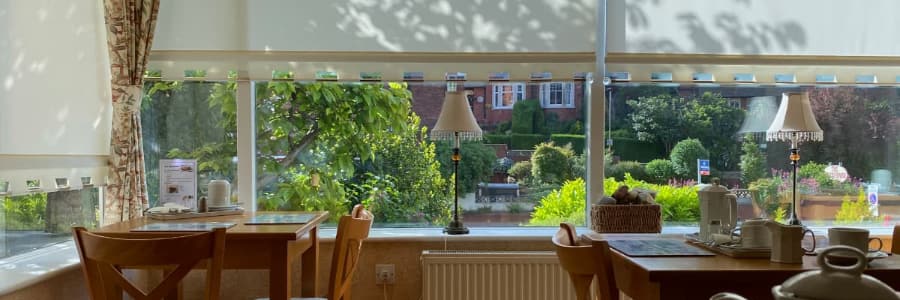
Kindness in retrospect
I’ve always thought that living life well was more important than writing, and typing that aloud I’m not sure if that sounds obvious, wise or stupid. I know writing regularly is part of the life I want, but often life events sweep away my desire to write, and trying to write under those circumstances results in needless suffering. My internal critic says I’m being lazy, or disorganised, or just not up to the job, but kinder voices reassure me that there is a season for all things.
My day job has been particularly tricky the last twelve months, a pressure built inside me to make a change, and to do a good job of that change required effort. It wasn’t planned in much detail, and it’s only clear what was happening looking back. The next bit of work is managing the transition from here to there. I’m being deliberately vague. I couldn’t write at the same time, that’s what I’m saying. It’s kindness in retrospect.
Last weekend I went to Chillercon, Scarborough, and I met lots of lovely people, which led to me buying even more books. More on that soon.
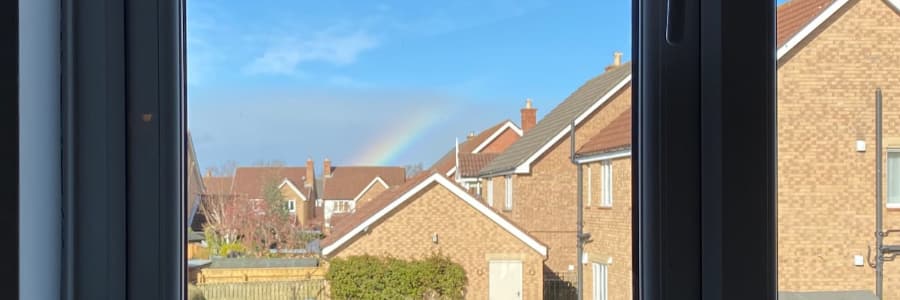
An oblique strategy
I’m in Wales with my dad today, Good Friday, taking him for a Covid test before he has a cataract operation Monday. He’s been waiting six years to get both eyes treated, and he’s worried something will happen to cancel it, which has happened several times already. I head home tomorrow and my sister takes over the ferrying around. I’ve had Covid this month, and my wife still has it, so I could do with a couple of days at home to settle my mind and reconnect with myself before I start back at work on Tuesday.
Sunday will be my tenth podcast on Patreon, so that’s ten weeks of learning how to speak clearly, record my voice, listen to my voice (which was uncomfortable to begin with), and think on my feet in front of a microphone. Of course, it’s just me, I’m not interviewing someone or in conversation, which is something else again, but I’ve learned a new skill. Part of the point was to offer something personal to patrons. Patreon doesn’t provide analytics, but from the lack of feedback, I suspect hardly anyone listens to it. Ten is a nice round number, so I’m wondering if that’s a good place to pause and think of something new to put on Patreon, or at least plot a new course for the podcast.
I’m using Twitter less, partly because I need to avoid the news since Russia started the war with Ukraine, and partly so that I could make more time to read books to talk about on the podcast. It’s an oblique strategy to get me reading, and from there to get me writing. My online activity starves me of literature while stuffing me full of semi-connections with distant people. All of this makes me think about the relationships between a writer, readers and other writers. The bottom line is, I need more in-person activity.
(I put up a Twitter poll about making a public podcast and amusingly half of the respondents said there were already enough podcasts. I don’t know why I asked, because if I do it, it will be for myself, not other people. Vanity, I suppose. Or I was fishing for compliments. Either way, it was a lesson in humility.)
I’m looking forward to the weather getting warmer. There’s a lot I want to do, and sunshine and warmth helps. Now that I’ve had Covid, a weight has lifted that I didn’t know was there. The monster wasn’t as fierce in my body as I’d feared, and I have at least a season’s grace. I’m excited for the spring into summer.
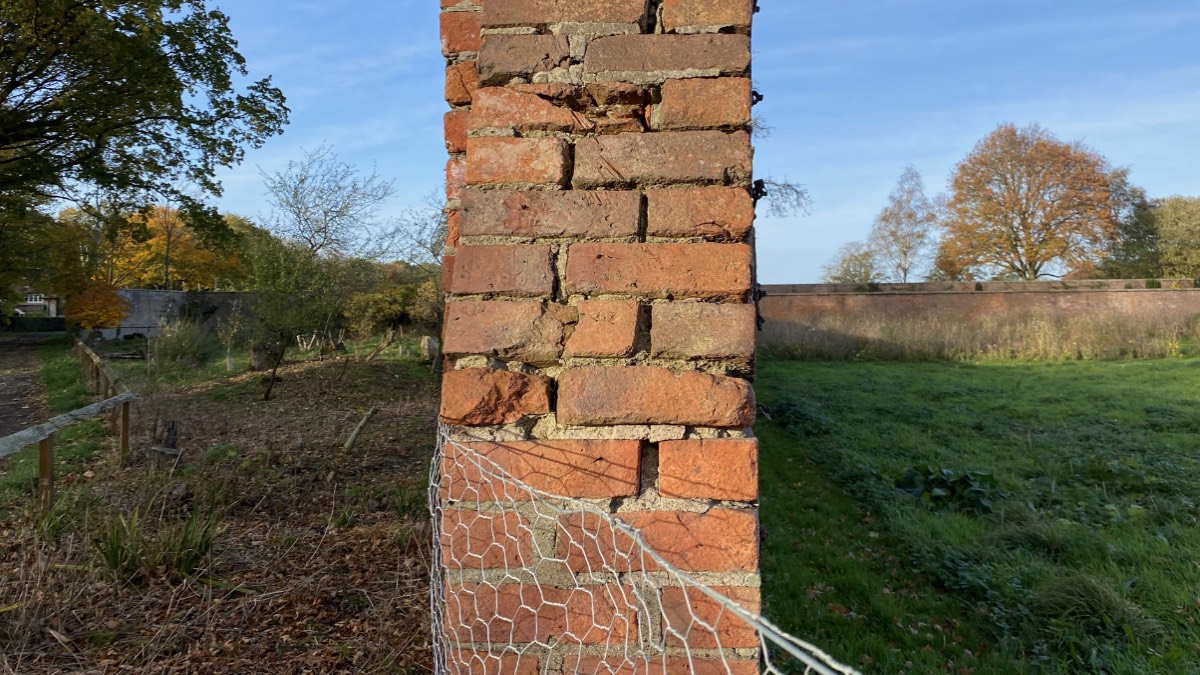
The great adjustment
Between January 2018 and December 2021, I watched 569 films. I know this because I track the films I watch on Letterboxd. That’s a lot of films. Not as many as more serious cinephiles, but a tremendous amount for someone who actually wants to be a novelist and not a filmmaker. I‘ve watched 157 films this year so far, which is on average fifty minutes a day, the length of a session of psychotherapy.
There was a gradual increase—2015 (11), 2016 (34), 2017 (61), 2018 (140)—and it’s linked to submitting my novel-as-dissertation in September 2017. After that, I needed to get away from writing, so I discovered horror film podcasts, and started a completely different adventure. I told myself that it was useful, which it was, to understand how the great (and not-so-great) films worked, thinking about story, narrative, dialogue, character arcs, all that good stuff, but looking back, I should have disengaged earlier and brought that knowledge back to my writing.
When the pandemic hit, and I was stuck working at home in a new job, with a constant newsfeed of virus fears, Trump and Brexit, I doubled down on films as a coping mechanism. (I know I keep going over this, but I think a lot of us are going to be dealing with a form of PTSD around the pandemic experience for some time to come.) I stopped reading for pleasure, partly because I lost my commute, and partly because I could feel a pressure building in me to be writing the next thing. I could watch a whole film in a ninety-minute evening slot and tick it off a list, but a novel was a longer undertaking, over several days, taking up valuable headspace that I could be using for writing. I would pick up a book, and quickly have to fight the urge to scan it, study it, and jump to the end. This was reading without engagement. I was still reading novels, but in a begrudging, desperate, manic, miserable way.
Films made me feel better in the world. Books made me feel worse. Films immerse you through image, sound, story and the fact you have to watch it for as long as it lasts, like a fairground ride. This intensifies the experience and heightens emotions, so it is closer to real life. I love that. But reflecting on a film is hard while you are watching it because it is still happening to you. It’s quite an invasive experience. It can feel overwhelming.
Books, on the other hand, give the control to the reader. A reader can be distracted by a knock at the door, read sentences a second or third time, look out of the window and daydream, recall a memory, read faster or slower, skip over a stressful scene, or even read the ending first. They can make notes in the margins and write in a notebook. You are immersed in the world of a book, but the book doesn’t demand your undivided attention. Books are a very forgiving companion. (I heartily recommend the chapter on reading in The Art of Rest, by Claudia Hammond.)
Here’s the heart of the matter for me: I can’t write without reading. To write, I need the written word as nourishment, and for me to feel nourished, I need to read slowly, with curiosity and my mind engaged.
This realisation, which is completely obvious on the surface, arrived because, in thinking about 2021 and what I might do differently in 2022, I looked back at the books I had read, and the films I had watched, and knew there needed to be an adjustment. I’m out of balance in how I get my story fix.
After four years of my adventure in films, I’m starting the great adjustment—fewer films, more books, and getting reacquainted with the gentle art of reading.

Keeping the story alive
Feeling the pull of Christmas, and seeing 2022 on the horizon, I’m looking at my work-in-progress, and it seems to be asking how we got here. It’s a patient and wise creature. It knows I haven’t said anything about it to anyone, bar its name to a very select few, perhaps out of superstition, but also, I think, to keep the energy it holds close to me, to nurture it, and show it I am taking it seriously. It’s not fodder for polite, or impolite, conversation, and certainly not to be talked about on Twitter.
The glimmers of this story coalesced in February 2019, while I was working on final edits for The Complex, where all I knew was that it was going to be told over several locations that I had dreamt and sketched on a map, it had a title, and most intriguingly, a revealing phrase about the protagonist. I was in a particularly manic phase of my life, because my day job was busy, The Complex wasn’t finished, and to self-soothe, I was watching way more films than was good for me. Ridiculously, I was also trying to learn German. My mind was leaping around like a loon, but I kept redrawing the map, came up with some character names and a couple of grand metaphors, and thought about character motivations. This was all between doing other life things. No draft words were written. These were just ideas I kept coming back to, with some occasional sentences in my notebook.
As an aside, I find free writing to be an essential creative writing tool, where you write without censoring yourself for twenty minutes or so. Another is writing conversations with characters in an imaginary theatre space, both as characters and the actors playing them. You can get them to rehearse with each other, improvise, and so on. Great for when you’re stuck.
Right, back to the story of the new story. For me, this is where it gets interesting. In my head, I had been telling myself that all through the second half of 2019, with The Complex being published, I was in marketing mode, spending way too much time on Twitter, asking for endorsement quotes, organising a book launch, looking for opportunities to talk in public, and all that necessary stuff. Looking back at my notebook from the time, in fact I continued to work on the new story all through the autumn, adding layers to the characters, changing their names, lightly researching the things they were into, drawing and redrawing the map, cutting out photos from magazines, and continuing to build up the world. I suppose I thought I wasn’t working on it because, looking back, there was no tangible progress, no words in a draft, but I’m way too hard on myself. Novels take the time they need, and life had to come first.
Then in February 2020 I started a new job, and the world went a bit mad.
I kept writing in my notebooks. I wrote a short story, Signal, which was published by Nightjar Press. Work was incredibly challenging, both kids were home from school, the line between work and home disappeared, and the news was full of the pandemic, Trump and Brexit. I watched a lot, a LOT, of films. It began to feel like I had writer’s block again, but I kept writing in my notebooks, and the make believe world slowly solidified.
When the cafes opened again in August 2020, I began a first draft. I was up to twenty thousand words when the second lockdown hit. I got it up to twenty-five thousand by Christmas, but the third lockdown, the big one of January 2021, totally messed me up. I retreated to my notebooks once more. (I seem to need a cafe to write a draft. It’s the only place I am guaranteed no interruptions. And home is now where I do software work.) For seven more months I wrote in my notebooks. Finally, in July 2021, I went back to the beginning of the draft, and in my little Caffe Nero, every morning before work, I edited it into some sort of shape.
What am I trying to say? It’s over two-and-a-half years since I started this next novel. It’s becoming real at last. I’m praying there are no more lockdowns, but perhaps I’m too far along now, with too much momentum, for another lockdown to block me. My notebooks helped me keep the story alive through the chaos. They are also the custodians of the facts of the story’s writing, its history, because I really can’t trust my memory.
I’d like to have a completed draft by my birthday, in March, which would be three years from inception. That appeals to my sense of neatness. And if it isn’t already abundantly clear, I write in my notebook every day. That’s what makes me a writer. It’s nothing to do with word counts or being published. It’s showing up in a notebook and keeping the creative flame alive.
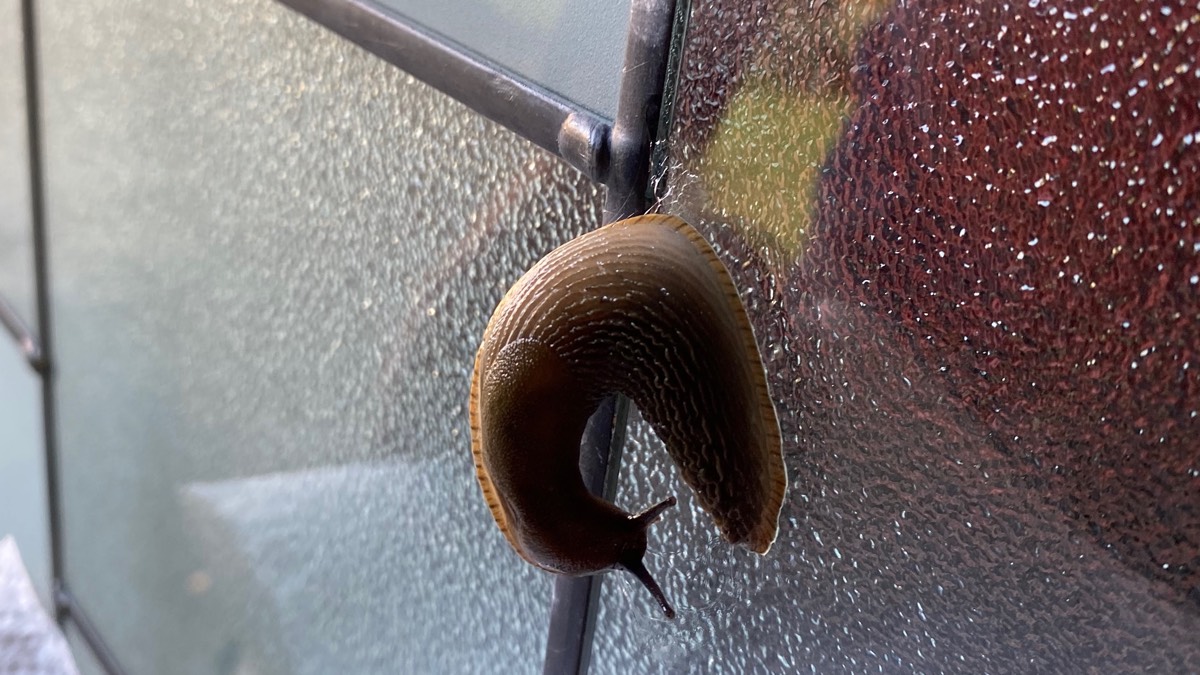
Stop rushing
Time isn’t real. The future is an abstraction. So says Alan Watts. I do rush things to get to the end of them—not always, but often enough for it to be a thing I’ve noticed over and over again throughout my life. I didn’t rush in my twenties. Rushing is something that started for me after my son was born, when the enormous pressure of being responsible for the life of another human being hit me. That was the moment I realised that whatever I wanted to do with my life had to fit around being a father first and foremost. Children require attention, a seemingly endless amount of it, and giving it to them is one of life’s great privileges, pleasures and sacrifices.
I can say truthfully that I did not rush my time with either of my children. I did a good job of being present with them and really experiencing fatherhood. The same with being a husband. I suppose it’s because I valued relationships, emotions and connection over my career, ambition, money or status. I don’t think I got the balance right, but at the same time I did the best I could with what I had. Perhaps that’s a psychological sleight of hand to make myself feel better about it. I don’t know.
I followed my father and grandfather in being a technician rather than a manager. I spent large portions of my time thinking about what to do rather than doing things. I didn’t keep up old friendships. I stayed in jobs for long periods of time rather than working my way up any ladders. None of these things were mistakes, though they sometimes feel like that, but they were choices, whether I was conscious of them or not.
All of which is to say, I am here, with this life behind me, and possibilities ahead. In this moment, writing this post, I am choosing not to rush, but instead listening to what I want to say to myself and letting the words flow through my fingers. Before starting to type, I was worrying over what film to watch, what book to read next, whether to push harder at the story I’m trying to finish for the end of the month, or if I should do yoga, crack through some chores, or worst of all worlds, start browsing through Twitter. Actually what I needed to do was sit quietly and listen. And here we are.
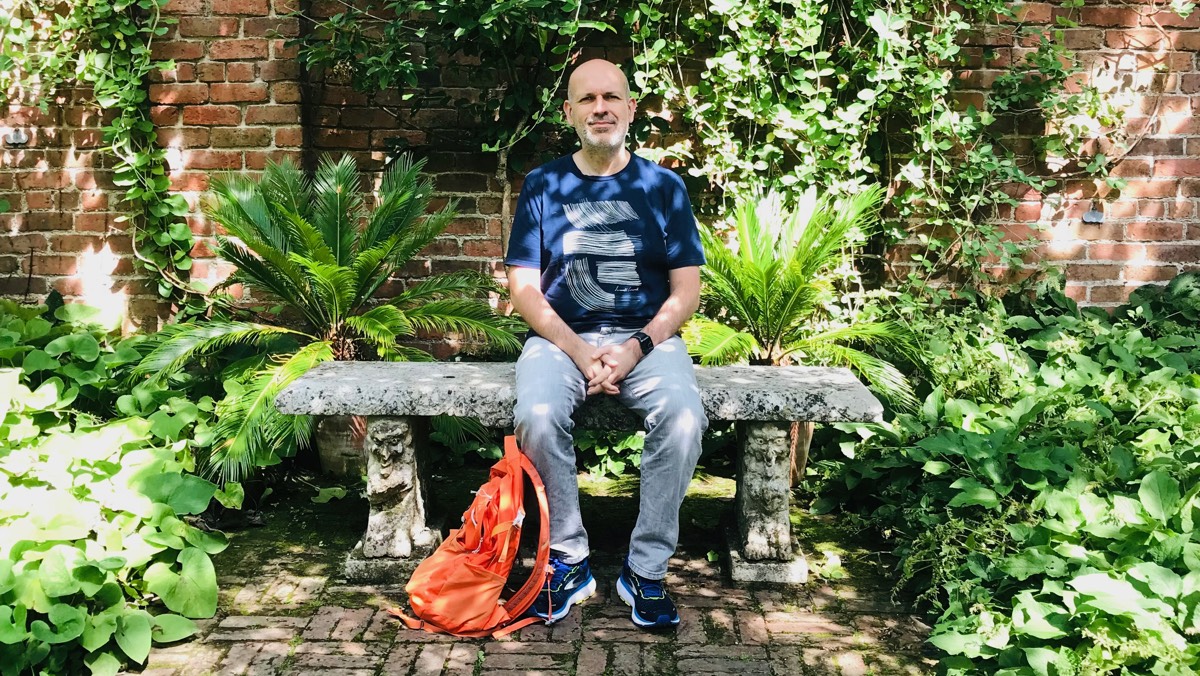
A seat in the sun
I’m sitting in the sun. August isn’t going to plan, but I’m doing the best I can with it. I won’t go into the details, we all have work and family dramas that flare up when we least expect them, but it means my focus on writing is suffering, and I might need to pause things to concentrate on what else needs to be done. C’est la vie.
But there is a short story I’m in the middle of writing, and it might want to be finished no matter what I think is sensible. If I commit to it, I will finish it, but at the cost of other things. I’d rather do everything I want to do. Of course, right? I don’t want to make the decision to stop writing too early—it might all come together if I keep it alive in my mind—but walking the line of what’s possible and not is both precarious and uncertain. Hell, writing is an ambiguous process at the best of times.
I’m doubtful, and it all seems like an intuitive rats nest, but I think I’ve talked myself into the juggle. To sail on and tack into the wind. Well, alright then.
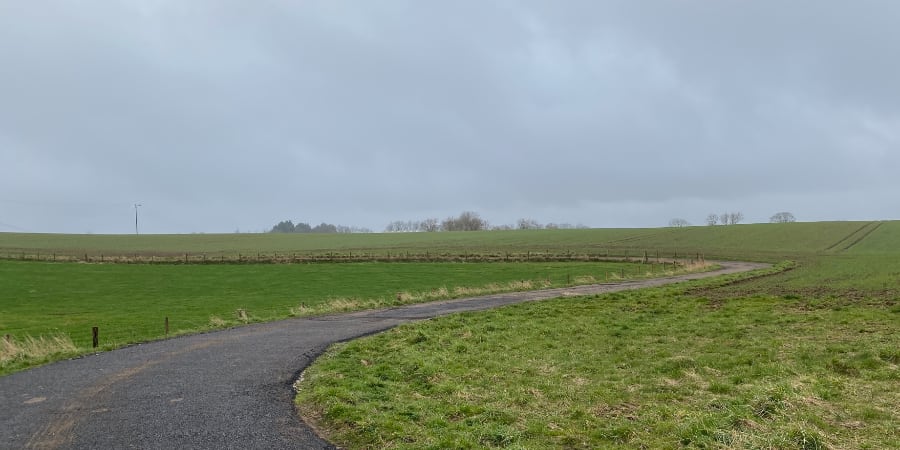
It’s Spring
This time of year is always strange. There is a drumbeat of family birthdays, including mine, and the pandemic has heightened the sense of time passing. My mother died at the end of February 2014, so this is seven years, unbelievably, since then.
Spring represents renewal. My father has had the vaccine, as has my sister and both my in-laws. I don’t know what my mother and grandmother would have made of all this if they were still alive. The so-far-successful rollout of the vaccines is making me feel cautiously optimistic for the first time since last March. Of course, that’s the other strange thing about this time – it’s a year since the pandemic hit. I remember the paranoia in my workplace, of people disappearing with ‘flu’, people trying to open doors with their knees (so they didn’t have to touch handles), and little coughs and widened eyes. I think I had it, but I’ll never know, and that mad month became a whole year of anxiety and physical withdrawal from regular life.
Finally, I feel hopeful. I don’t know what the rest of 2021 will bring, but my daughter goes back to school on Monday and will be with her friends for the first time since December. In three weeks time I will be able to drive to the beach and walk along the sand. My family and friends are okay. It’s Spring, and it feels like it.
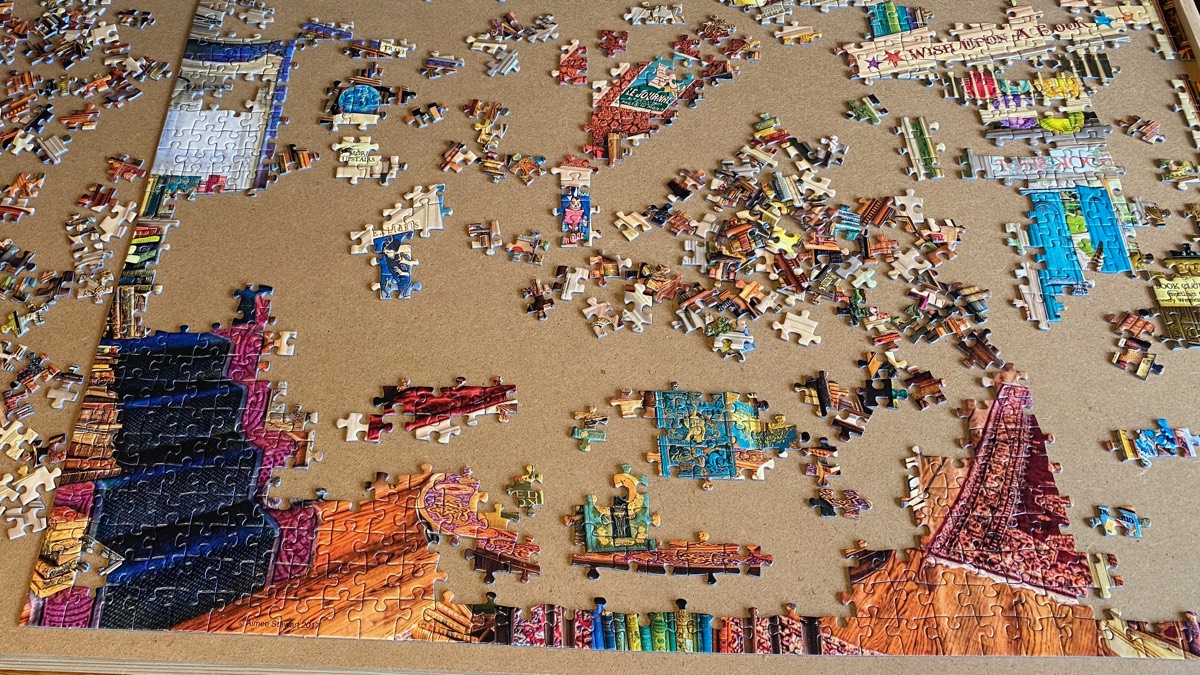
Jigsaws
My mother loved to do jigsaws. She would stay up late, after every one else had gone to bed, and do them on the dining table, which is also where she would do the bookkeeping for whichever company she was working for at the time. When she died, I found all the lists and accounts she kept for the household budget, and I remembered how she showed me how to keep track of my spending when I went off to university. She was renowned for balancing complicated accounts to the penny with only a calculator, pen and pencil, even after computers could do it all much faster. That was the jigsaw energy. She always needed things to be right when it came to her work.
I see that tendency in myself. When I do a jigsaw, I can feel my mother with me, and that’s comforting. I can let life flow over and around me, and I’ll never know now whether she was able to do that, but when something feels important, and I set my mind to it, I need it to be done to the best of my ability.
For Christmas last year I bought my daughter a jigsaw of a book shop. Facing a long November and December in another lockdown, I dug it out again, and bought a puzzle board to put it on, so I could push it under the sofa between sessions. (That didn’t work out, it turns out our sofas are all too low to the ground for the board to fit. It’s still useful.) As I’ve worked on it, painfully aware of the guilt I’m feeling about not working on my next novel, it’s become clear I fight my natural instincts. I make creativity more painful than it needs to be.
There are parallels with writing in the way I do jigsaws. I start by turning over all the pieces and looking for the edges. My mother taught me that. The edges provide a boundary. Then I look for the vivid, smaller sections, which are easier to find in the mass of pieces, and put them in roughly the right spots. At some point these sections connect to each other, or most thrillingly to the edges, and things speed up. By this point, my mind has spent enough time on the problem to begin to see connections before I consciously notice them. My fingers move to a piece without knowing why, and it fits somewhere unexpectedly. The whole assembles itself because I’m fully engaged, and the power of my pattern-matching mind, which I undoubtedly got from my mother, shines though.
Don’t get me wrong, that isn’t how I wrote my first book, and I’m not sharing my jigsaw-as-creative-writing metaphor because I know it’s right, but it might help me unlock my current work-in-progress, which also seems to be waiting for when I can sit at a cafe table again, where I’ve always written most of my words. The jigsaw energy and writing energy is surely also linked to the way I write software. It’s human to want to assemble patterns out of what seems like chaos. My problem-solving mind craves patterns. Anyway, that’s what I wanted to say about jigsaws.
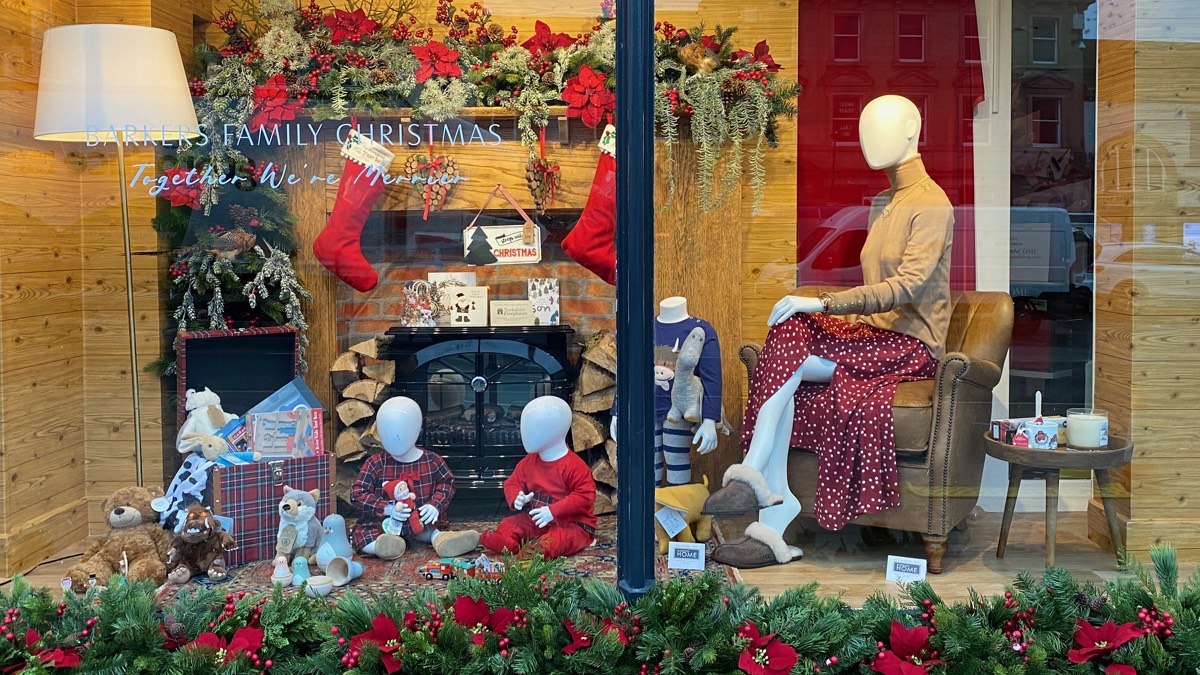
Creativity 2.0(.21)
I’m in a fallow period, pottering around, looking for the next thing. I started a jigsaw, read a novel, watched the first half of Homecoming (Season 1, with Julia Roberts), listened to podcasts on my walks, and wrote in my notebook. Work was busy, and working from home I find it hard to switch off. I’m easily distracted. The US election sucked a lot of energy out of me. The news is everywhere now. Since finishing #31DaysOfHorror I’ve lost momentum in personal projects. That groove was a powerful source of creative energy.
Finally, though, I’m beginning to feel more centred. Within a couple of weeks, 2021 has gone from being the beginning of the end of things, to the beginning of something new — Joe Biden and Kamala Harris, a COVID-19 vaccine, the end of Dominic Cummings — these are all excellent for my mental health. The world is starting to feel safer.
I now know I can watch a film, make some notes about it, let it simmer in the back of my mind for a few days, then edit it into a decent piece of writing, and I can do that several times a week if necessary. That’s new. I’m not sure what those #31DaysOfHorror blog posts were. They felt like reviews, but I didn’t want to give an opinion on whether films were good, bad, or worth someone’s time. Instead, I tried to find what I liked about each film, then connected it with previous films or my own experiences. I felt obligated to provide a brief synopsis, perhaps because I always had the reader in mind, and they might not have seen the film. I wanted each post to make sense and stand alone.
A handful of people read them. That felt good. The one-film-a-day structure was a potent catalyst for making it a habit, as was posting a link to the post on Twitter. I was pretty wrung out from watching so many films in such a short period. I did love it, but after I’d finished, once I’d let myself decompress, it felt like a massive relief. However, I engaged more deeply with films knowing I had to write about them — that was the power of the challenge, and the public commitment that came with it.
I stopped watching films and writing blog posts completely in November. Drifting creatively is useful, but I’ve learned that without a project, eventually I lose sight of the coastline of my true interests and drift out to sea. I’d like to keep the bits that worked from #31DaysOfHorror, but make it less intense, more sustainable, and more aligned with my current goals.
Posting to my blog every day kept me accountable. That was my measure of progress. Looking back at those thirty-one posts I see what I achieved, and I feel proud of a good creative project. Having a page on my website pulling those posts together makes it feel coherent, just like seeing The Complex and Signal existing in the world does.
My next novel is plodding away in the background. I sit with it for up to an hour every morning. Some days I write a hundred words, occasionally I write none, but on other days I might write as much as five hundred. It’s intermittent and slow-going. Publishing short blog posts and posting them on Twitter — hell, just posting on Twitter and getting a few likes — gives me a feeling of accomplishment, and a dopamine rush writing a novel can’t compete with day to day.
A short story is a month’s work for me, and a novel is years of effort. This novel might never get published and only be read in three years time by one diehard fan willing to read an 80,000-word .docx file. I love you, man, but if the Time Wizard showed me his crystal ball, and that was how it was going to be, I’m not sure if I would go on. The hope of being published and having my work exist on its own terms in the world is a sustaining force. Without that hope, I’d like to think I would still write stories, because it serves some internal purpose, but honestly, I don’t know.
That’s what I’m competing with in my head. I don’t want my writing practice to feel leaden and dull. I’m writing good sentences, even though it is difficult work. Writing The Complex, I had the structure of a creative writing Masters to get a draft finished. Now I’m in the world, a published author, but with no agent, no contract, no support structures, working full-time at home in a completely different field, living through a pandemic, with one child in secondary school and another at a COVID-ridden university, trying to keep some momentum going.
There is transition energy afoot. It’s been a fuck of(f of) a year. I’m starting my annual process of looking back, so I can look forward. I’m lucky in all the ways that matter. Writing is hard — it has always been hard — but it still feels like the most important thing I can do with my spare time. I don’t write for the pleasure of writing, but it means a lot to me, and I manage to create space in my life to do it. For that I am thankful.
Over the next few weeks, as we come to the end of 2020, everything I’ve written about here will shake out. I can’t stay still for long, although I do try. The ideal I hold in my head of a slow, loving, meaningful life always seems just out of reach, but I do my best with what I have.
I wonder what next year will bring? I wonder how I can make my craft feel more fun? With those questions in mind, we enter a season of change.
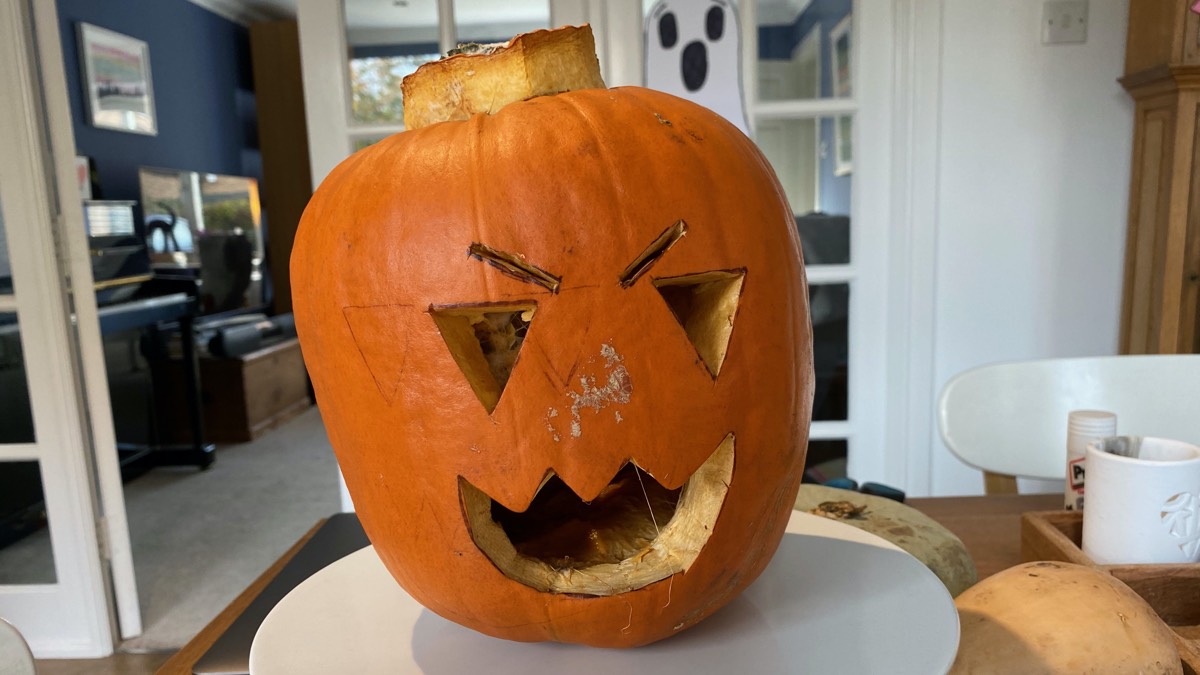
Lockdown, Part 2
Halloween has been and gone, Bonfire Night is cancelled, and I’m writing a pep talk to myself as in England we go into another lockdown. It’s shit we have to do it, but we do, and better late than never. These are tough times and these periods of isolation are hard on the spirit.
I have a novel to write, a pile of books to read, and films to watch. I also have a family with me, and I continue to do my software development job from home. This is probably the future of my line of work, which I have mixed feelings about. I’ve lost my morning cup of sanity coffee at Caffe Nero, but I’m healthy, my family are healthy, and I can pay the bills. I feel grumpily grateful.
So, do what you need to do to stay safe and sane in whatever situation you find yourself in. The world is full of good people, and this will pass.
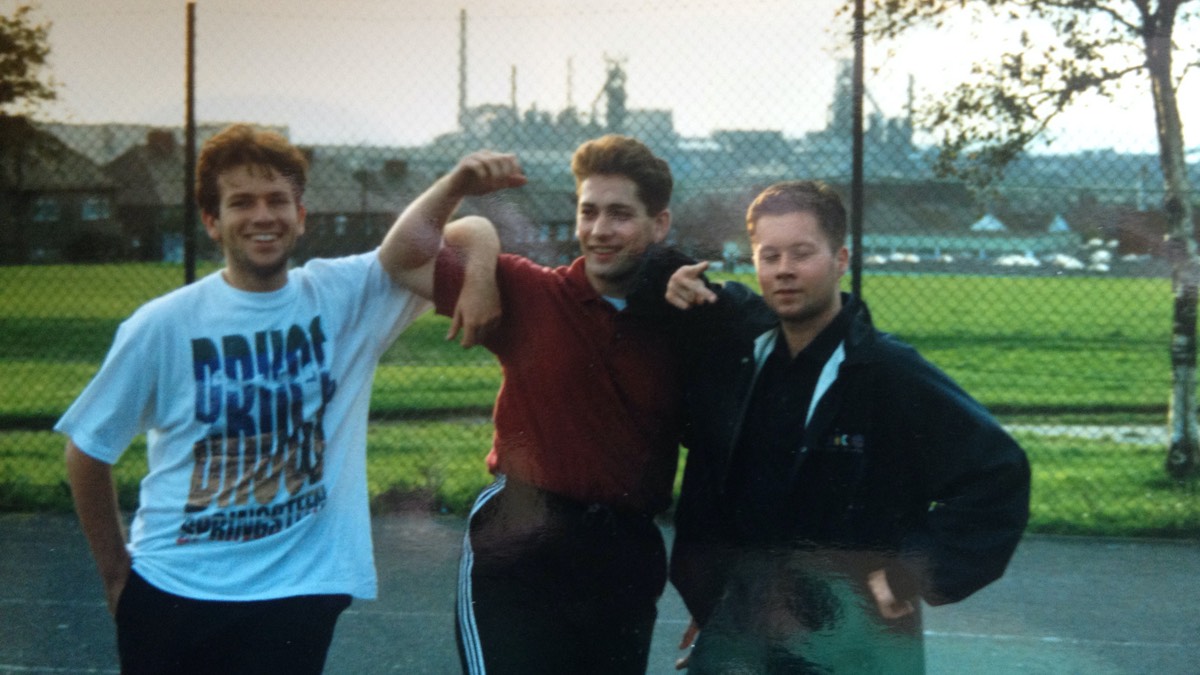
Reality Bites
I first watched Reality Bites when it came out in 1994, the summer of my final year at university. I’d finished cramming for my exams and it was obvious I wasn’t going to be an astrophysicist, or any kind of physicist, and there was nothing else I wanted to do with my life. You would think I was the films prime audience, but I don’t remember thinking much about it, good or bad, beyond having a deep crush on Winona Ryder. Her character, Lelaina Pierce, was a film-maker, and creative, funny, principled, determined, vulnerable, and a fighter. She was everything I wanted in a woman. She was who I wanted to be, in retrospect, and like me, she wanted to do her thing, or do nothing.
In the sweet, terrible month of waiting for my degree results, wandering a familiar campus, hanging out in a house I shared with my closest friends, with no classes and no commitments, I sensed this was a time unlike any I would have again. It felt precious, and I wanted it to last forever. I wasn’t ready to get a job. I wasn’t thinking about the future. I had no plans.
We meet our film heroes immediately after graduation, on a woozily high rooftop, being filmed by Lelaina, who is making a documentary about her friends and their generation. They speak and joke about while her terrible camerawork judders and spins around them, often perilously close to the roof’s edge. It’s dizzying. They are about to jump into their working lives. Vicky (Janeane Garofalo) works at a Gap; Sammy (Steve Zahn) plays guitar in a band; Troy (Ethan Hawke) is a singer. They quickly end up sharing one apartment, but the story only really begins when Lelaina flicks a still-smouldering cigarette into the car of yuppie Michael (Ben Stiller). He crashes into her and they end up going on a date. Her ambition is fired up, but so is Troy’s jealousy.
It’s easy to forget just how big a star Winona Ryder was in 1994, and Ethan Hawke credits her with getting the film green lit. I also didn’t know this was Ben Stiller’s directorial debut. The script was written by Helen Childress, who was closely involved in the film’s shooting. It feels like a collaborative labour of love. Hawke gives an outstanding performance as the prickly, self-hating Troy. I know he ends up having ‘reasons’, but really, he’s such a manipulative dick. Michael, who is sweet in many ways, is also insensitive, and not in Lelaina’s league. She’d have been much better off with me. In South Wales. In my parents’ house.
Reality Bites is still surprisingly affecting. I had low expectations. I’m not sure why. There is something about your early twenties that is particularly painful and potent. You are working out who you are, and the world is only just beginning to press on you. Now, when I am forced by life once again to change course, as I guess a lot of us are coming out of lockdown, Reality Bites is a reminder of the possibilities when you step into the unknown. I want a new tribe around me. I feel a bit lost, vulnerable and unsure, but also hopeful and looking for reserves of courage. Unlike Roger Ebert, I love this film. Twenty-six years on, it really stands up.
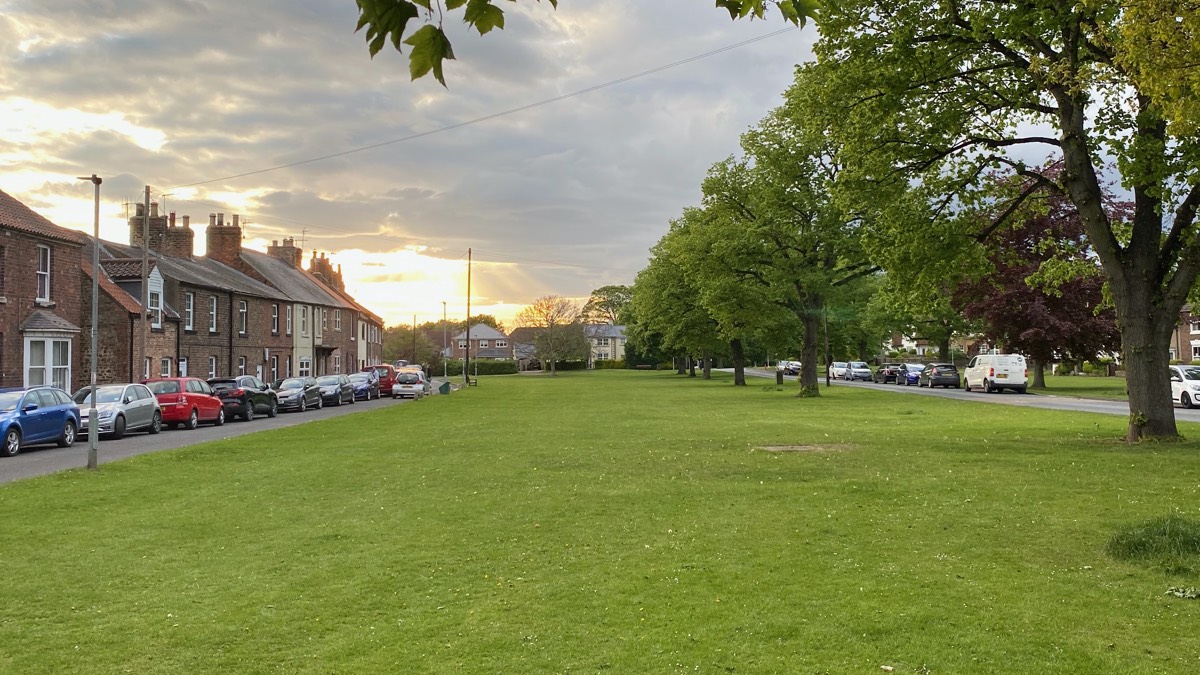
I’m doing okay in my little lockdown bubble. We live in a relatively rural spot, we have a garden, and we are working remotely pretty successfully. The days are going by fast — they all feel very similar, whether work days, or weekends, or holidays. I have built up routines, initially to cope, but I’ve come to enjoy them, and going back to work in a separate physical location might now be harder than I could ever have expected.
It’s tricky moving from the day into the evening. It’s hard to write, or read, or watch films, because I would usually do those things in the same room I am now programming in, and after dinner and a stroll, going back to my desk isn’t appealing. I don’t have a laptop anymore. I can’t watch films on the main television while my daughter is up. She isn’t old enough for, or interested in, my genre tastes. I’m looking for space.
The concept of my website as a digital garden appeals to me. I found that blog post because I’ve started using an RSS reader to follow people’s website content, and one of the feeds I subscribe to also talked about it. I miss that sort of longer-than-twitter-but-shorter-than-an-essay conversation between people. It still happens in the software development community, which as a writer who often resents his time programming computers, is ironic.
This is all to say that I’m going to try to post here more regularly, and that means the posts are going to be shorter, less coherent, and more for me than for readers. (Yes, I know I’ve said that before.)
I want somewhere to write that is in public, but away from the noise of Twitter. Twitter got me writing again, but I’ve lost that feeling of being free to write whatever I want. I can’t help but always have one eye on how I’m coming across, now I have a book published. I still haven’t worked out what that means to me. Perhaps this is part of that.
Listening to: Over Yet, Hayley Williams, on Petals for Armor.
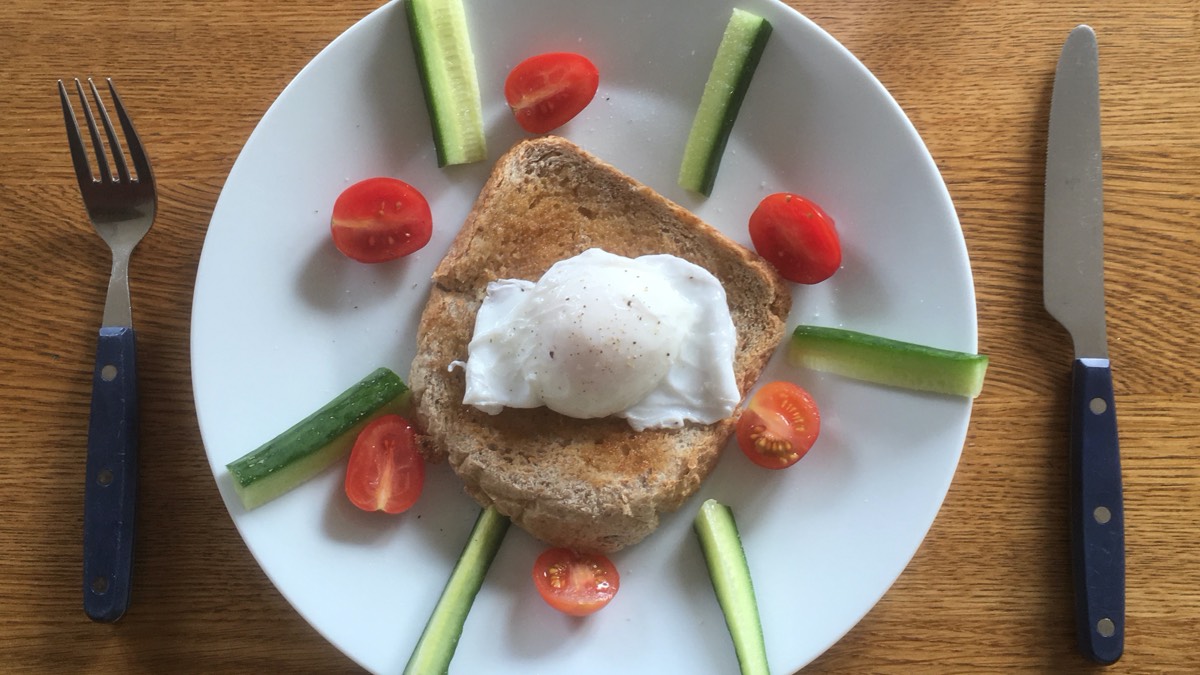
Minimalism
My son and daughter are both YouTube watchers, but until this year I’d never felt the need to try it. The whole influencers and cult of personality thing put me off. Then last week I decided to look on YouTube for tips on meditation and I found a Matt D’Avella video, I Meditated for 1 Hour Every Day for 30 Days.
D’Avella is a classic self-help vlogger who specialises in minimalist living and is a documentary filmmaker by trade, which makes his videos impeccably shot and edited. He’s personable, good-looking, self-aware, talks about his feelings, has a lovely apartment, and is funny. I watched the video, then watched all the others. He made me feel good. It was comforting.
I remember Leo Babauta’s Zen Habits blog from the late noughties (check out his archives, which go right back to January 2006), and in tech circles in particular, there was an endless debate about the best ways to live as simply and effectively as possible in an increasingly overwhelming online world. People were beginning to burn out — and this was way before social media became all-consuming. I was trying to start a business at the time, and I too bought Getting Things Done and The 4-Hour Workweek. I suppose I’m saying I have a mixed history with this stuff.
Minimalism, which is living simply and within your means, seems to be a hotter topic than ever. My wife and I have both worked four days a week for most of the last decade so that we can be around more for the children. In a way, minimalism is our natural philosophy, partly from financial necessity, but also because we both like order and neatness.
I develop software for a living, and I write stories in my spare time. Now that I’ve completed my Masters in Creative Writing, and The Complex has been published, I feel like I’ve levelled up to being a professional writer. I have two professions and I need to give them both their due. Fresh thinking is required.
So, to solve this complex problem, I did what I always do: I cleaned my desk.
I now have the piles of short story collections that were on either side of my monitor (and supporting my laptop speakers) on the shelves behind me. Novels live on the downstairs shelves, split between the living room and the kitchen-dining room. I can now do whatever I need to do on a sparsely populated desk without always thinking, I should really read one of those short story collections, or, I should roll those story dice for once and see what comes up, or, that tennis ball shouldn’t be there, but I don’t know where else to put it. (I put the tennis ball on the pile of useful things in the corner of the room that would usually be on my desk.)
So. I cleaned my desk. I feel like a minimalist. I have two professions. Got it. Onwards.
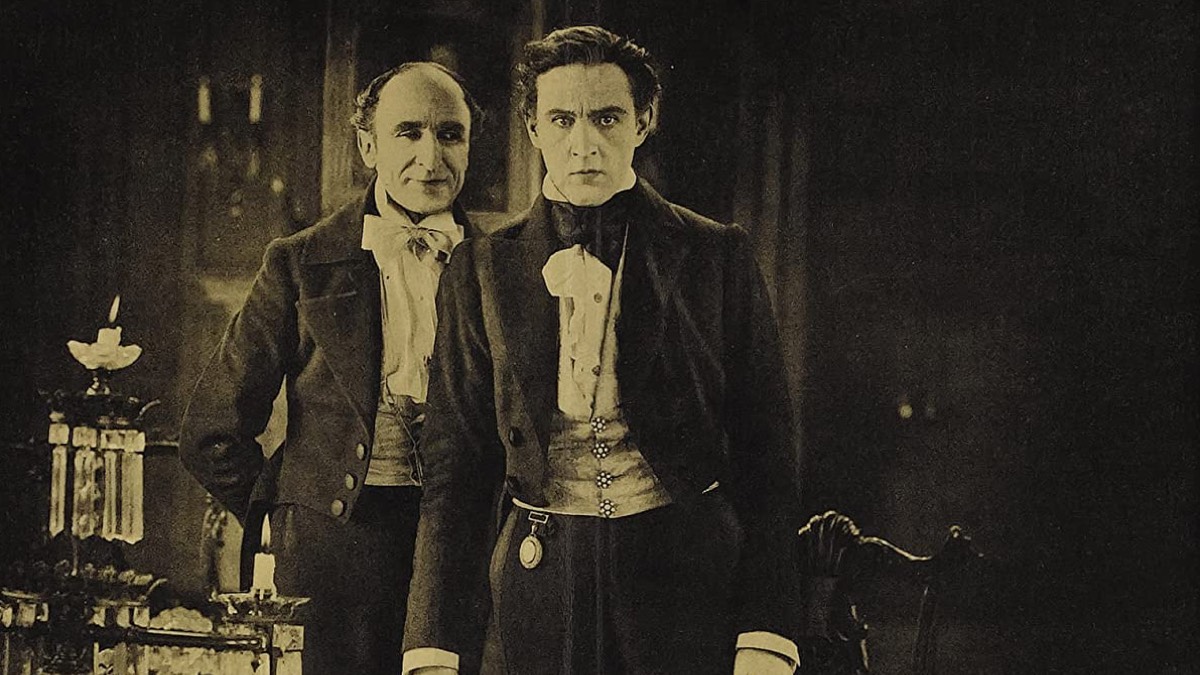
Blogging with Jekyll
I’ve updated this website, hopefully in ways that aren’t obvious to the reader, but that let me have more control (and fun) in the months ahead. It’s been through several iterations over the years. The last one was built with PHP, used a .htaccess file and a PHP script to create clean URLs, and was statically generated from markdown files, so there was no connection to a database. I wrote it all myself, which wasn’t a great use of my time, and at a conference I heard about a tool that would do the same thing, plus so much more. That tool was Jekyll and now this site is generated by it.
I suppose the fact that I could do this illustrates the other side of my working life. I’m not recommending it over Wordpress, especially if you aren’t comfortable with installing software on your computer using the command line. But it was fun to play with, and it gave me a chance to play on a rare writing/software crossover project.
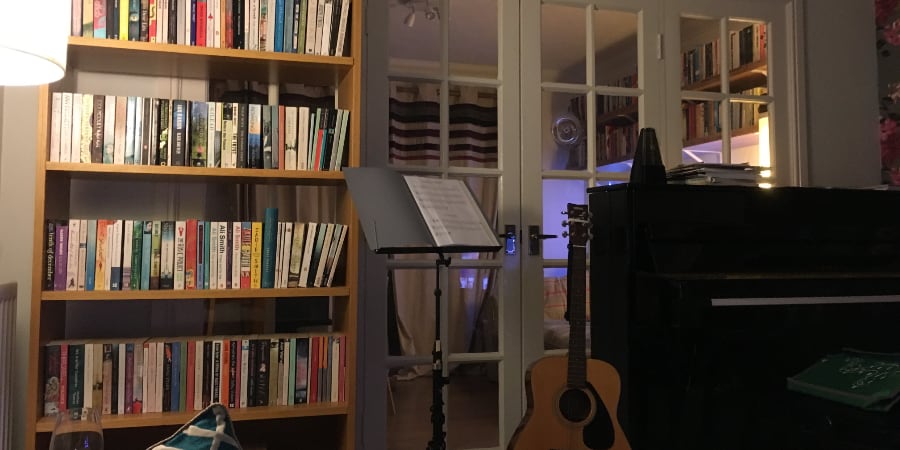
I like being at home
Woke up late. My son is in Sydney for three weeks and when I walk past his bedroom the quiet inside makes me sad. I’m trying to be more mindful as I go about my low-key morning. Last night I watched the first half of Let the Right One In before my wife and daughter got home from a New Year’s Eve party. This morning I read the first third of Written on the Body, mostly while sitting at the kitchen counter with a cup of coffee. I like being at home. It’s been a busy Christmas.
I took a break and listened to Wolf Alice on the expensive headphones I bought years ago and never used. Music sounds amazing through them, but they are heavy, make my ears hot and the cable has a squeak when I move my head. On a whim, and because the cable was long enough, I did some stretching while listening to the last track on Visions of a Life. My body felt tight and neglected. I wondered if I could do yoga while listening to Queens of the Stone Age. I felt stone-aged. I wanted visions for my life.
On the chopping board I have left a swede and yesterday’s leftover braised red cabbage. There is only frozen turkey to have with it, and that’s, well, frozen. It’s the intention I like. I am going to cook the swede and make it delicious. I have to work on my meal planning though. I wish I had a pork chop or a steak. C’est la vie.
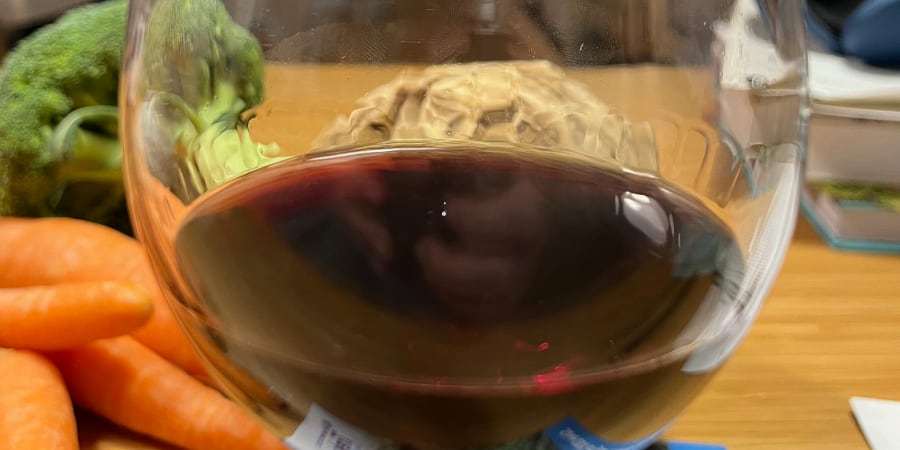
Red cabbage
After being away for a few days with my father, I came back to a fridge of random uncooked vegetables — red cabbage, beetroot, sprouts, carrots, swede and broccoli. With another load of veg arriving in a few days time, I looked up in Nigel Slater’s Tender how to cook red cabbage. It was a beautiful vegetable to chop, the purple and white patterns blissed me out. I fried the chopped cabbage in a couple of teaspoons of olive oil, seasoned it, added balsamic vinegar, put the lid on the pan and left it for fifteen minutes.
It was mid-afternoon. I ate some of the cabbage wrapped in a slice of bread. It felt like a treat. Red cabbage. Simple pleasures.

Habits
My mind is circling the same wishes for the New Year that it circles every year, to do with health and writing. Each year I make some progress, never enough to make the desire for change to go away, but usually enough in the face of unconscious defences, personal circumstances and events to make me feel some pride.
It’s dispiriting that my health is still bothering me to the extent it does. I made great strides in my writing through completing the MA, but without the structure of seminars and deadlines I’m floundering a little.
I don’t think resolutions work particularly well, but I like the symbolism of a new year to mark changes. Perhaps this year I could resolve to pay more attention to the habits I have that frustrate me and keep tweaking them until they take me where I want to go. Then it is not to do with symbolic dates at all and becomes something I do without thinking whether I should. A habit, in fact. The habit of working on my habits.